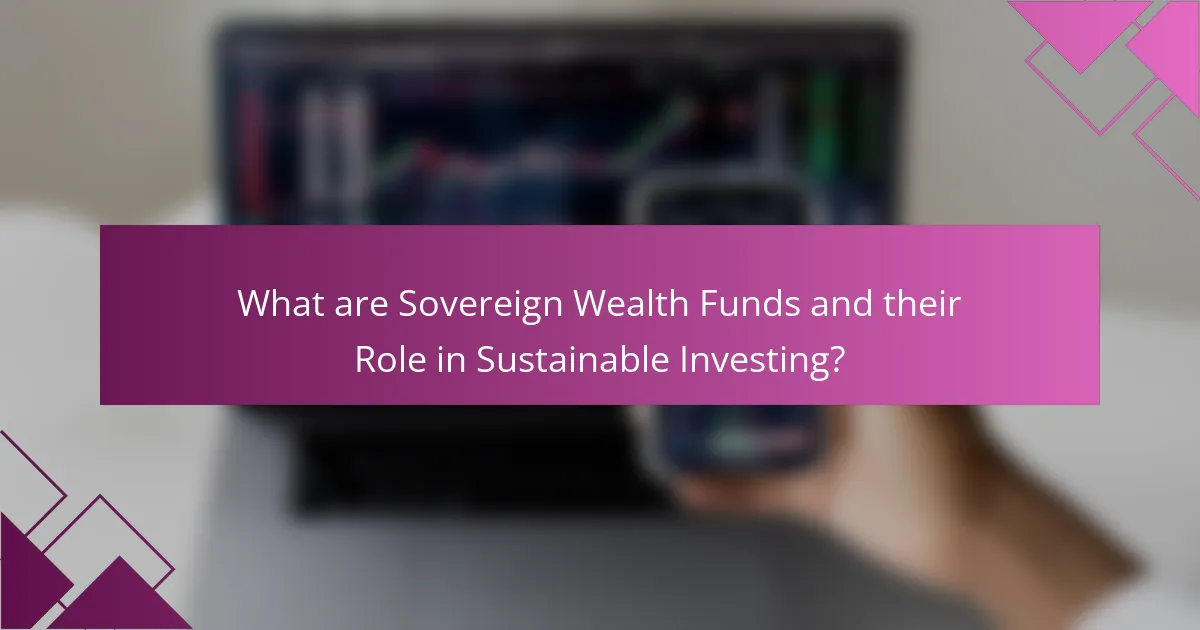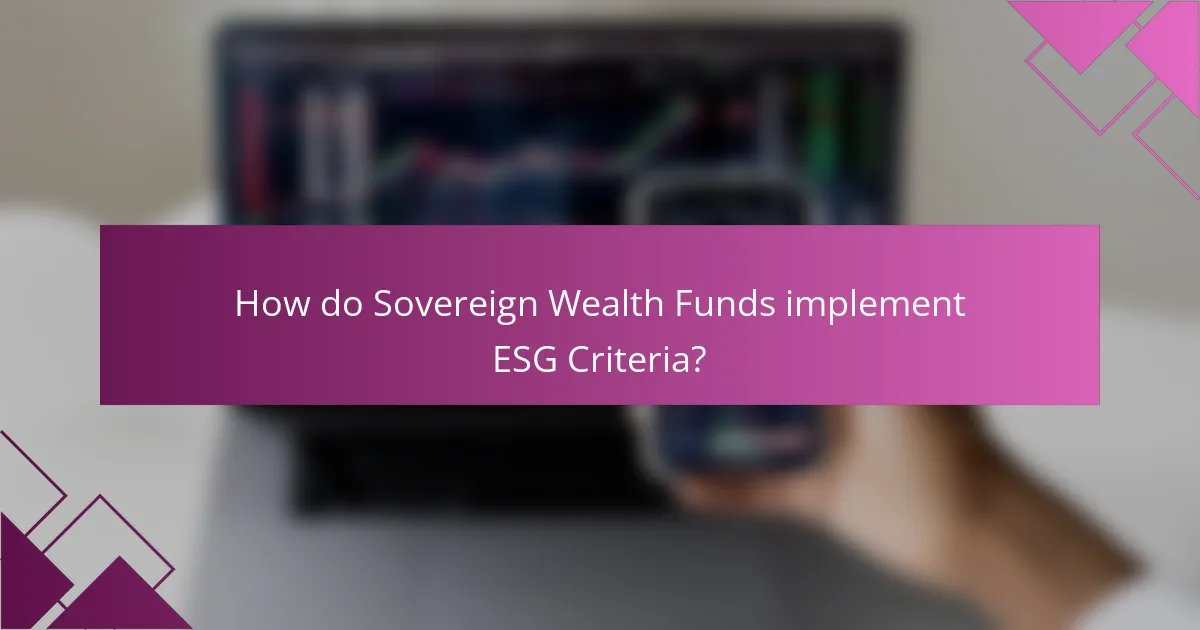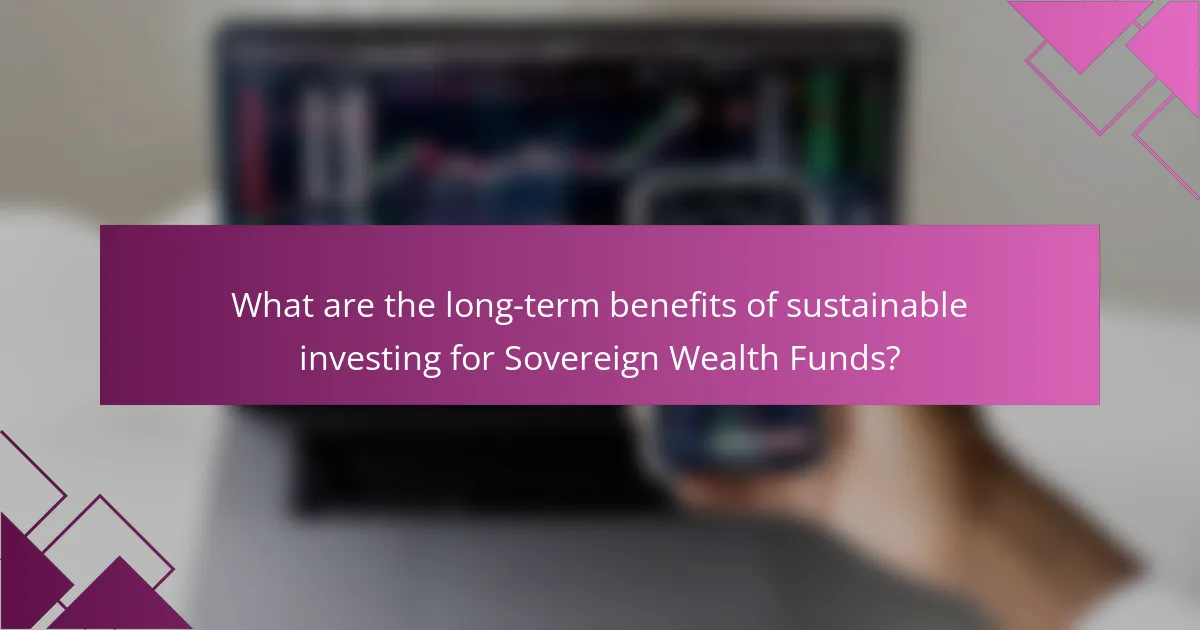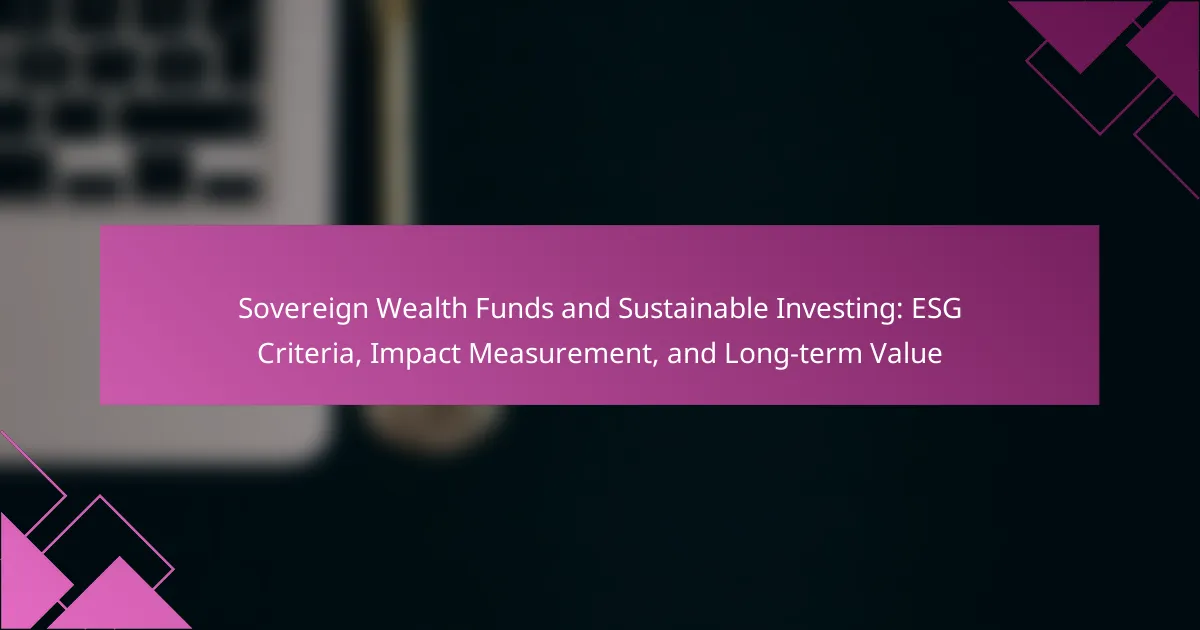
What are Sovereign Wealth Funds and their Role in Sustainable Investing?
Sovereign Wealth Funds (SWFs) are state-owned investment funds or entities. They manage national savings for the purpose of investment. SWFs invest in a variety of assets, including stocks, bonds, real estate, and infrastructure. Their role in sustainable investing is increasingly significant. Many SWFs incorporate Environmental, Social, and Governance (ESG) criteria into their investment strategies. This shift reflects a growing recognition of the importance of sustainability in long-term value creation. For instance, the Norwegian Government Pension Fund Global emphasizes responsible investment practices. Studies show that integrating ESG factors can enhance financial performance. Thus, SWFs are pivotal in promoting sustainable economic development globally.
How do Sovereign Wealth Funds operate?
Sovereign Wealth Funds (SWFs) operate by managing state-owned investment funds. These funds invest in various asset classes such as stocks, bonds, real estate, and alternative investments. SWFs are typically funded by the surplus revenues from natural resources or national savings. They aim to achieve long-term financial returns and stabilize the economy. For example, the Government Pension Fund of Norway invests globally to diversify its portfolio. SWFs also play a role in supporting national development goals and ensuring intergenerational wealth. Their operations are guided by specific investment strategies and risk management frameworks. Many SWFs adhere to principles of responsible investing, integrating ESG criteria into their investment decisions.
What are the key characteristics of Sovereign Wealth Funds?
Sovereign Wealth Funds (SWFs) are state-owned investment funds. They invest in a variety of assets, including stocks, bonds, real estate, and infrastructure. SWFs are typically funded by revenues from natural resources or fiscal surpluses. They aim to achieve long-term financial returns while also stabilizing the economy. SWFs are characterized by their large asset pools, often exceeding hundreds of billions of dollars. They operate with a focus on risk management and diversification. Many SWFs incorporate Environmental, Social, and Governance (ESG) criteria in their investment strategies. This approach enhances their commitment to sustainable investing and long-term value creation.
How do Sovereign Wealth Funds differ from other investment funds?
Sovereign Wealth Funds (SWFs) differ from other investment funds primarily because they are state-owned investment vehicles. SWFs are funded by government surpluses, often from natural resources or foreign exchange reserves. In contrast, other investment funds typically rely on private capital from individual or institutional investors. SWFs focus on long-term financial returns and economic stability for their countries. They also often have a mandate to support national development goals. For example, the Government Pension Fund Global of Norway is designed to ensure wealth for future generations. This distinct purpose sets SWFs apart from traditional investment funds, which primarily seek profit maximization for their investors.
What is the significance of ESG Criteria in Sovereign Wealth Funds?
ESG criteria are significant for sovereign wealth funds as they guide investment decisions based on environmental, social, and governance factors. These criteria help funds assess long-term sustainability and risk management. Sovereign wealth funds increasingly prioritize ESG to align with global sustainability goals. Adopting ESG criteria can enhance portfolio performance by identifying resilient investments. A 2021 study by the CFA Institute found that 75% of institutional investors consider ESG factors essential for long-term value creation. This underscores the importance of integrating ESG into investment strategies for sovereign wealth funds.
What do ESG Criteria encompass?
ESG criteria encompass Environmental, Social, and Governance factors used to evaluate investments. Environmental factors assess a company’s impact on the planet. This includes carbon emissions, resource usage, and waste management. Social factors examine a company’s relationships with employees, suppliers, and communities. This includes labor practices, diversity, and community engagement. Governance factors focus on a company’s leadership, executive pay, audits, and shareholder rights. Together, these criteria provide a comprehensive framework for sustainable investing. They help investors identify risks and opportunities that traditional financial analysis may overlook.
How do ESG Criteria influence investment decisions?
ESG criteria influence investment decisions by guiding investors toward companies with sustainable practices. Investors assess environmental, social, and governance factors to gauge long-term viability. This assessment helps identify risks and opportunities that traditional financial metrics may overlook. For example, companies with strong ESG performance often experience lower capital costs. Research shows that firms with high ESG ratings tend to outperform their peers financially over time. Additionally, investors are increasingly prioritizing ESG factors due to growing consumer demand for responsible business practices. As a result, investment funds are reallocating assets to align with ESG principles. This shift reflects a broader trend toward sustainable investing, impacting capital flows in global markets.
Why is Impact Measurement important for Sovereign Wealth Funds?
Impact measurement is crucial for Sovereign Wealth Funds as it evaluates the social and environmental effects of their investments. This process helps funds align their portfolios with sustainable development goals. It enhances accountability to stakeholders by providing transparent data on investment impacts. Accurate impact measurement can also inform strategic decision-making. Furthermore, it supports risk management by identifying potential negative outcomes associated with investments. Studies indicate that funds prioritizing impact measurement often achieve better long-term financial performance. This correlation underscores the importance of integrating impact measurement into investment strategies.
What methods are used for Impact Measurement?
Impact measurement utilizes various methods to assess the effects of investments. Common methods include quantitative metrics, qualitative assessments, and mixed-method approaches. Quantitative metrics involve numerical data analysis, such as financial returns or social impact scores. These metrics provide concrete evidence of performance. Qualitative assessments focus on personal experiences and narratives to gauge impact. Surveys and interviews often gather this data. Mixed-method approaches combine both quantitative and qualitative data for a comprehensive view. This method enhances understanding by integrating diverse perspectives. Furthermore, frameworks like the Global Impact Investing Network (GIIN) and the Impact Management Project (IMP) offer standardized guidelines for measurement. These frameworks support consistency and comparability across different investments.
How can Impact Measurement affect long-term value creation?
Impact Measurement directly influences long-term value creation by assessing the effectiveness of investments. It provides data on social, environmental, and economic outcomes. This data helps investors understand the impact of their capital allocation. Enhanced transparency leads to better decision-making. For instance, companies that measure impact can identify areas for improvement. This can result in increased efficiency and reduced costs. Studies show that organizations focusing on impact measurement often achieve higher financial returns. Therefore, consistent impact measurement aligns financial goals with sustainable practices, driving long-term value.

How do Sovereign Wealth Funds implement ESG Criteria?
Sovereign Wealth Funds implement ESG criteria by integrating environmental, social, and governance factors into their investment processes. They conduct thorough assessments of potential investments to evaluate ESG performance. Many funds establish specific ESG guidelines that align with their investment objectives. They also engage with companies to promote better ESG practices and transparency. Some Sovereign Wealth Funds utilize third-party ESG ratings to inform their decisions. Additionally, they may participate in collaborative initiatives to enhance ESG standards across industries. Evidence of this approach can be seen in the increasing number of funds publicly committing to responsible investing principles. For instance, the United Nations-supported Principles for Responsible Investment (PRI) has seen participation from numerous Sovereign Wealth Funds, showcasing their dedication to ESG integration.
What strategies do Sovereign Wealth Funds use for sustainable investing?
Sovereign Wealth Funds (SWFs) employ various strategies for sustainable investing. These strategies include integrating Environmental, Social, and Governance (ESG) criteria into their investment processes. SWFs actively engage with companies to promote sustainable practices. They also allocate capital to renewable energy projects and sustainable infrastructure. Additionally, SWFs invest in funds that focus on impact investing. They measure the impact of their investments on social and environmental outcomes. Many SWFs participate in global initiatives to enhance sustainable finance. These efforts align with long-term value creation and risk management.
How do these strategies align with ESG Criteria?
These strategies align with ESG criteria by integrating environmental, social, and governance factors into investment decisions. Sovereign wealth funds utilize these criteria to assess risks and opportunities related to sustainability. For instance, they may invest in renewable energy projects to address environmental concerns. Social factors are considered by evaluating the impact of investments on communities and labor practices. Governance aspects focus on ensuring transparency and ethical practices in management. Research shows that funds adopting ESG criteria often achieve better long-term financial performance. This alignment enhances their reputation and mitigates risks associated with unsustainable practices.
What challenges do Sovereign Wealth Funds face in implementing these strategies?
Sovereign Wealth Funds face several challenges in implementing sustainable investing strategies. One major challenge is the lack of standardized ESG criteria. Different organizations define ESG factors differently, leading to inconsistencies in evaluation. Another challenge is the limited availability of reliable data. Many companies do not disclose sufficient information on their ESG practices. This makes it difficult for Sovereign Wealth Funds to make informed investment decisions.
Additionally, there is often a conflict between short-term financial returns and long-term sustainability goals. Sovereign Wealth Funds may face pressure from stakeholders to prioritize immediate profits. Regulatory challenges also exist, as different countries have varying regulations regarding sustainable investing. These factors complicate the integration of ESG criteria into investment strategies.
Furthermore, the evolving nature of sustainable investing poses a challenge. New trends and best practices frequently emerge, requiring continuous adaptation. Sovereign Wealth Funds must invest in capacity building and expertise to keep pace with these changes. Lastly, there is a risk of greenwashing, where companies exaggerate their sustainability efforts. This can mislead investors and undermine the credibility of sustainable investing initiatives.
How do Sovereign Wealth Funds measure their impact?
Sovereign Wealth Funds measure their impact primarily through ESG (Environmental, Social, and Governance) criteria. These funds evaluate investments based on sustainability and ethical standards. They assess the environmental performance of companies in their portfolios. Social impact is measured by analyzing labor practices and community engagement. Governance factors include board diversity and transparency practices. Additionally, funds often use metrics such as carbon footprint reduction and social return on investment. Reports and third-party assessments validate these measurements. For instance, the Global Sustainable Investment Alliance reported that sustainable investing reached $35.3 trillion in assets in 2020. This data demonstrates the growing importance of impact measurement in investment strategies.
What metrics are commonly used for measuring impact?
Common metrics for measuring impact include Social Return on Investment (SROI), Environmental Impact Assessments (EIA), and Key Performance Indicators (KPIs). SROI quantifies social value created relative to investment made. EIAs assess the environmental effects of projects or investments. KPIs track specific performance outcomes related to sustainability goals. Other metrics include the Global Reporting Initiative (GRI) standards and the Impact Reporting and Investment Standards (IRIS). GRI provides a framework for sustainability reporting. IRIS offers a set of metrics for measuring social, environmental, and financial performance. These metrics help evaluate the effectiveness of investments in achieving desired impact outcomes.
How does impact measurement vary across different funds?
Impact measurement varies across different funds based on their objectives and frameworks. Different funds may prioritize distinct ESG criteria, leading to diverse measurement methodologies. For instance, some funds focus on environmental impact, while others may emphasize social outcomes. The metrics used can include qualitative assessments, quantitative data, or a combination of both. Furthermore, funds may adopt various reporting standards, such as GRI or SASB, influencing their impact measurement. A study by the Global Impact Investing Network (GIIN) highlights that 70% of impact investors report using different metrics based on their specific goals. This variation reflects the unique mission and investment strategy of each fund.

What are the long-term benefits of sustainable investing for Sovereign Wealth Funds?
Sustainable investing provides long-term benefits for Sovereign Wealth Funds (SWFs) by enhancing financial returns and reducing risks. SWFs that adopt sustainable practices often experience improved portfolio performance. A study by the Global Sustainable Investment Alliance found that sustainable investments can outperform traditional investments over time. Additionally, sustainable investing helps SWFs mitigate environmental and social risks. This is crucial as climate change and social unrest can negatively impact asset values. Investing in sustainable companies fosters innovation and resilience, leading to more stable returns. Furthermore, sustainable investing aligns with the growing demand for responsible investment practices among stakeholders. This alignment can enhance the reputation and credibility of SWFs, attracting more capital. Overall, sustainable investing positions SWFs for long-term success in a rapidly changing global landscape.
How does sustainable investing contribute to financial performance?
Sustainable investing enhances financial performance by aligning investment strategies with environmental, social, and governance (ESG) criteria. Companies that prioritize sustainability often experience lower operational costs through energy efficiency and waste reduction. This can lead to improved profit margins over time. Research shows that firms with strong ESG practices tend to outperform their peers in the long run. A study by Morgan Stanley found that sustainable equity funds outperformed traditional funds by 4.3% annually from 2004 to 2018. Additionally, sustainable investing attracts a growing pool of investors, driving demand and potentially increasing asset values. Thus, sustainable investing not only supports ethical practices but also contributes positively to financial returns.
What evidence supports the financial benefits of sustainable investing?
Sustainable investing generates financial benefits through superior long-term performance. Studies show that companies with strong ESG (Environmental, Social, Governance) practices outperform their peers. A 2020 study by Morgan Stanley found that sustainable equity funds outperformed traditional funds by 4.3% annually. Additionally, a report from the University of Oxford indicates that firms with robust sustainability practices experience lower capital costs. The performance of sustainable investments is also supported by research from MSCI, which demonstrates that ESG-focused portfolios tend to have lower volatility. These findings collectively highlight the financial advantages of sustainable investing.
How can sustainable investing enhance stakeholder trust?
Sustainable investing enhances stakeholder trust by aligning financial goals with ethical values. This approach demonstrates a commitment to environmental, social, and governance (ESG) principles. By prioritizing sustainable practices, organizations signal responsibility and transparency. Stakeholders are more likely to trust entities that actively mitigate risks related to climate change and social inequality. Research shows that companies with strong ESG performance often experience improved financial performance. A study by MSCI found that firms with high ESG ratings have lower capital costs and better operational performance. Therefore, sustainable investing fosters a trustworthy relationship with stakeholders through shared values and proven financial benefits.
What best practices should Sovereign Wealth Funds follow for sustainable investing?
Sovereign Wealth Funds should adopt best practices that prioritize Environmental, Social, and Governance (ESG) criteria in their investment strategies. These funds must integrate ESG factors into their decision-making processes. They should establish clear sustainability goals aligned with international frameworks, such as the United Nations Sustainable Development Goals (SDGs). Regularly assessing and reporting on ESG performance is essential for transparency. Engaging with portfolio companies to improve their sustainability practices is also crucial. Furthermore, diversifying investments across sustainable sectors can enhance long-term value. Studies indicate that funds employing these practices often achieve better risk-adjusted returns. For example, a 2020 report by the Principles for Responsible Investment found that sustainable investments outperformed traditional investments in many cases.
How can funds effectively integrate ESG criteria into their investment processes?
Funds can effectively integrate ESG criteria into their investment processes by establishing clear ESG frameworks. These frameworks should define specific ESG metrics and objectives. Funds can utilize data analytics to assess potential investments against these metrics. Regular monitoring of ESG performance is essential for ongoing evaluation. Engaging with companies on ESG issues promotes accountability. Collaborating with ESG rating agencies can enhance assessment accuracy. Additionally, funds should communicate their ESG strategies transparently to stakeholders. Research indicates that integrating ESG factors can lead to better long-term financial performance.
What role does transparency play in sustainable investing?
Transparency is crucial in sustainable investing as it builds trust among investors and stakeholders. It allows for clear communication of ESG criteria and investment strategies. When organizations disclose their sustainability practices, investors can assess the alignment with their values. Transparency also facilitates accountability, ensuring that funds are used effectively for sustainable impact. Studies show that transparent companies often outperform their peers, attracting more investment. For example, according to the Global Sustainable Investment Alliance, assets in sustainable investments reached $35.3 trillion in 2020, highlighting the growing demand for transparency. This trend underscores the importance of clear reporting in fostering long-term value creation.
Sovereign Wealth Funds (SWFs) are state-owned investment entities that manage national savings for investment purposes, focusing on long-term financial returns and economic stability. This article explores the role of SWFs in sustainable investing, highlighting the integration of Environmental, Social, and Governance (ESG) criteria into their investment strategies. It discusses the significance of impact measurement, the challenges faced in implementing sustainable practices, and the long-term benefits of aligning investments with ESG principles. Additionally, the article outlines best practices for SWFs to enhance transparency and stakeholder trust while achieving sustainable value creation.
